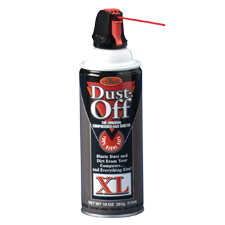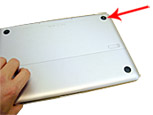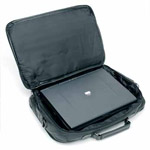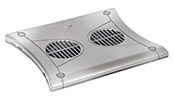Top 5 Tips To Prevent Laptop Overheating
We're going to take a look at the top 5 ways to prevent laptop overheating.
Introduction To Preventing Laptop Overheating
Preventing your laptop from overheating is very important if you want to keep your laptop running problem free for years to come. A laptop that runs hotter than what it was designed for can and usually will have internal parts prematurely fail.
Since today’s ultra fast laptop computers can get up there in temperature, especially during the summer months, it is more important than ever that you keep your laptop running cool. Sure it’s pretty normal for most laptops to get fairly hot even when running within temperature guidelines, though it’s unfortunately hard to really tell when a laptop is running hotter than it should.
And if you continue to run it super hot for prolonged periods of time eventually something will give, and more often than not the hard drive is the first thing to go.
Unfortunately the hard drive is the most important piece of hardware being that it holds all your important data. This makes following best practices to prevent laptop overheating crucial.
We’re going to take a look at the top 5 was to prevent laptop overheating. Following these general guidelines should help you keep your laptop running cool and problem free for years to come.
Top 5 Tips To Prevent Laptop Overheating |
Tip 1: Remove Dust From Your Laptop Computer Via Compressed Air
 Utilizing a simple 5 dollar can of compressed error to clean out your laptops vents and fans can do wonders for laptop cooling performance. Utilizing a simple 5 dollar can of compressed error to clean out your laptops vents and fans can do wonders for laptop cooling performance.
Overtime dust will build up in the vents and on the laptops internal fans reducing optimal airflow through the hot internal case. And as dust builds up more and more your chances of laptop overheating vastly increase.
Internal laptop fans when caked with dust will spin out of balance and not properly cool your laptops crucial internal components. On top of this an out of balance fan will experience much more wear and tear, potentially leading to an early fan failure.
If there is visible dust on your laptop often you should used compressed error I’d say at least 4 times a year, of course adjust accordingly if your laptop is consistently dusty. For laptops that aren’t visibly dusty compressed error can be used less often.
When using compressed error it is best to blow in the fan vents in the direction of airflow. Normally air is drawn from vents on the bottom of the laptop through the case and out the side of the laptop.
When blowing air it is also best to use short bursts of air instead of using sustained air pressure. The reason for this is that you don’t want to potentially push the fan beyond its manufacturer rated speed, damaging it during the cleaning process. These simple tips can help you preserve your laptop and keep it running smoothly.
Tip 2: Do Not Use Your Laptop On Surfaces That Restrict Or Block Airflow
 This is one of the simplest yet most effective tips to prevent laptop overheating. This is one of the simplest yet most effective tips to prevent laptop overheating.
All too often people use their laptops on less than ideal surfaces, blocking the crucial air intake vents on the underside of the laptop.
Common surfaces that can cause laptop overheating include beds, carpets, couches, and even your own lap.
Take a look at the bottom of your laptop, notice the small rubber feet? These small rubber feet are actually very crucial, designed to allow airflow to the intake vents on the underside of a laptop.
When you place a laptop on a soft surface the laptop will often sink into the surface and potentially overheat if the intake vents are completely blocked, etc. Even if your laptop doesn't have intake vents on the bottom it can still overheat when placed on a less than ideal surface.
If you are going to place your laptop on a bed, carpet, or other similar surface, a large hardcover book or equivalent flat surface works wonders and may just prevent laptop overheating.
And if you use your laptop on your lap like most individuals, try to make sure the underside vents are not blocked. Spreading your legs to allow airflow to the vents or even using a flat surface between the laptop and your legs works wonders.
Tip 3: Completely Shutdown A Laptop Before Placing It In A Laptop Case
 Shutting down a laptop completely before placing it into a laptop case will prevent laptop overheating from occurring. Storing a laptop in a case while it is still running may cause severe laptop internal damage. Unfortunately you’d be surprised how many individuals do this because of improperly configured power saving settings, carelessness, or lack of knowledge. Shutting down a laptop completely before placing it into a laptop case will prevent laptop overheating from occurring. Storing a laptop in a case while it is still running may cause severe laptop internal damage. Unfortunately you’d be surprised how many individuals do this because of improperly configured power saving settings, carelessness, or lack of knowledge.
Heat will build up very quickly in a sealed laptop case, and if you add hot weather to the mix a laptop disaster is waiting to happen. If you consistently do this and your system doesn’t happen to fry, at the minimum the extra wear and tear from all the excess heat will still shorten the lifespan of the laptops internal components, making a premature component failure imminent.
Even if you use standby mode, your work and settings are saved into memory so a laptop will generate some heat for it still needs to draw a small amount of power from the laptop battery. Standby mode doesn’t draw too much power, though when you place the laptop in a sealed environment such as a laptop case, potential problems can occur even with standby modes low energy requirements.
The simple solution to all this, always turn your computer completely off, or at the minimum use the laptop hibernation mode. Hibernation puts your open documents and programs on your hard disk, and then turns off your computer. Hibernation is great because you can still quickly resume where you left off without any laptop overheating risks.
Tip 4: Give Your Laptop Some Lift To Increase Airflow
 Propping your laptop up higher can substantially increase airflow to the bottom of the laptop and potentially prevent laptop overheating. This tip is especially useful during the summer months when temperatures rise. Propping your laptop up higher can substantially increase airflow to the bottom of the laptop and potentially prevent laptop overheating. This tip is especially useful during the summer months when temperatures rise.
If you use your laptop computer on a day to day basis, I highly recommend you utilize this cost free tip, for it will not only keep your laptop cooler but over time it may prevent premature component failure. Heat is a laptops worst enemy so keeping it cool is an essential best practice.
To prop your laptop up you can use a medium sized book or equivalent surface. I personally put a book underneath both of the back feet on the laptop so the back of the laptop is raised. Just make sure the book, etc. is not obstructing any of the laptops bottom intake fans.
On the other hand you’re not always going to have a book handy, so if you prefer to spend a little money for a permanent solution, you can actually buy third party rubber feet or suction cup type feet which you can place on the bottom of your laptop permanently or temporarily depending on the product purchased.
But whether or not you choose to use an old fashioned book or purchase a third party permanent solution to raise your laptop, both options will increase airflow and help prevent laptop overheating.
Tip 5: Purchase A Laptop Cooling Pad
 A laptop cooling pad is a fantastic way to prevent laptop overheating. If you put your laptop through long hours of use, the small price you will pay for a laptop cooling pad is totally worth the admission. A laptop cooling pad is a fantastic way to prevent laptop overheating. If you put your laptop through long hours of use, the small price you will pay for a laptop cooling pad is totally worth the admission.
And if you have a bad habit of placing your laptop on a bed, carpet or other surface that can potentially block the vents causing the laptop to run hotter, or you live in a place with a hot climate, a laptop cooling pad is even more ideal.
Most laptop cooling pads are designed to draw heat away from the laptop, allow better airflow to the bottom of the laptop, and some even have built in fans for cooling the laptop further.
A cooling pad can also prevent premature laptop component failure because it will always insure your laptop vents are unobstructed and proper airflow is getting to the underside of the laptop.
Most laptop cooling pads are light weight and portable like today’s laptops, and there are tons of choices out there. Some of my favorite manufacturers of laptop cooling pads include Cooler Master, Evercool, Belkin, Targus, and Rosewill.
Conclusion To The Top 5 Tips To Prevent Laptop Overheating
We hope you've enjoyed our guide on how to prevent laptop overheating. If you have questions or feedback for us please Ask The Computer Tech.
See also:
Return
from Laptop Overheating to Home Page
Contact us | View site map
|